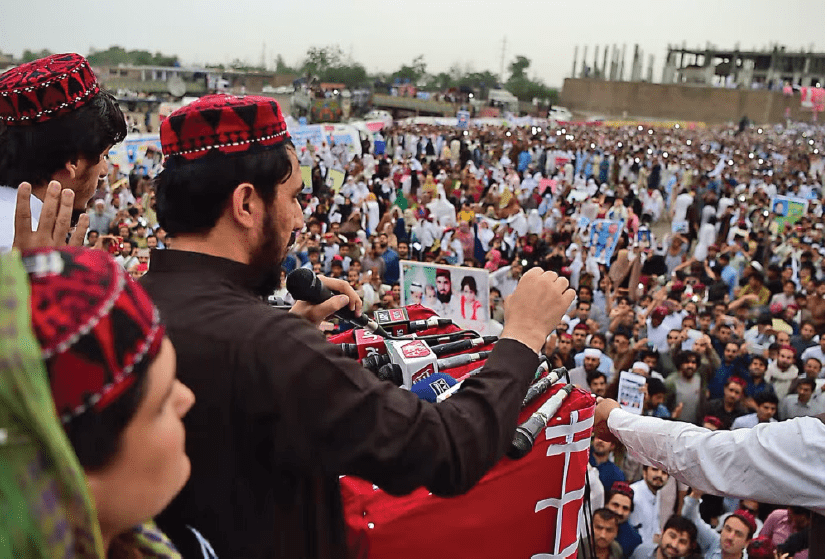Eight students from Dera Ismail Khan formed the Mehsud Tahaffuz Movement in 2014 for the protection of Pashtun rights. One of them is the now renowned leader Manzoor Pashteen, hailing from South Waziristan, as Mehsud Tahaffuz Movement took shape of Pashtun Tahaffuz Movement (PTM) on February 1 2018. This was sparked by the killing of Naqeebullah Mehsud in 2018 in Karachi which was perceived by the Pashtuns as an incident of racial profiling of the ethnic group. Things exacerbated when Rao Anwar, considered responsible for the encounter of Naqeebullah Mehsud, was not held accountable and a commission was not formed to inquire the killing.
PTM is a grassroots, civil rights movement. It can also be considered an anti-war, pro-peace movement. Even though it represents a specific ethnic group one cannot necessarily term it a nationalist movement. It consists of students, educated Pashtuns, and 40 per cent of them include victims of the war unleashed on the region which will be elaborated upon next.
There is a background to the currently banned non-violent uprising of the mostly young Pashtuns who now have the support of their elders. And that is war. When Pakistan, under the dictatorship of Pervez Musharraf, accepted to enter America and its allies’ ‘War on Terror’ in Afghanistan against Taliban. This affected the borderlands that Pakistan shares with Afghanistan with ethnic Pashtuns residing in both parts as the Afghan Taliban’s offshoot Tehreek-e-Taliban in Pakistan was also the target. The majority of the Pashtuns residing in the northern region were displaced and innocent civilians were killed in the region as ‘collateral damage’. This enraged the local population.
And the signs of it are seen even today when the aforementioned Pashtun Tahaffuz Movement’s (PTM) Jirga held from 11-13 October was held in Jamrud’s Khyber district with the government’s support. The main demands and recommendation of the Jirga included ‘a two-month ultimatum for militant groups and military forces to leave the militancy-hit areas, pledging otherwise to decide to remove the militants on their own. Other demands include affordable electricity for KP, at PKR5/unit instead of the current tariff of over PKR60/unit, free electricity for tribal areas as in the past, and severance of electricity connections in case of lead-shedding. There were demands made that PTM lawyers should initiate action against land grabbers occupying lands of people who died in the war and missing persons, possibly going to the ICJ, if necessary and opening of Pak-Afghan Border from Chaman to Dir for visa-free trade, else border check posts will be closed. The demand was also made that Khyber Pakhtunkhwa be given its share of natural gas and water, military courts and internment camps be closed and that all political prisoners be released. Amongst other ultimatum, the formation of a judicial commission to probe extrajudicial deaths and disappearances was put forth including for the Internally Displaced Persons to be returned home without any extortion.
If we unpack these demands, Abdullah Momand, a journalist, was of the opinion that PTM doesn’t have the capacity to drive out militants or militancy from the areas considering the security situation in Khyber Pakhtunkhwa especially South and North Waziristan. This could, however, be considered a pressure tactic. On the demand for electricity price reduction he said that this demand is more appropriately suited for the provincial government under the 18th amendment as the federal government solely provides resources and the nitty gritty such as ‘bijli chori’ are matters of the local government and leaders. On the issue of trade with Afghanistan he mentioned that due to restrictions placed on Durand Line, trade with Afghanistan has stopped or has been rendered negligible. These restrictions were placed in the name of security.
The demands are legitimate to a large extent and the Pakistani state will have to revise its National Action Plan and security policy at least; not only for the sake of face saving but to effectively address the grievances of the marginalised people of the war-torn region.
Otherwise the populace will have no choice but to believe that the rangers wear uniform in the daytime and ‘pagri’ when the night befalls.
The writer is our Editor-in-chief.



